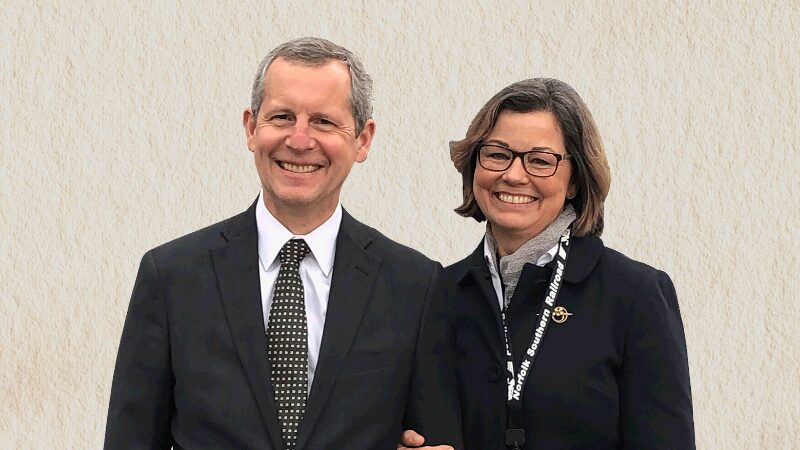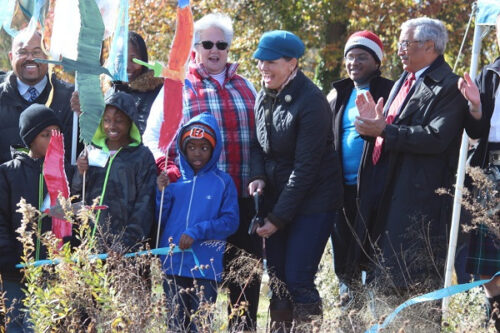Philanthropy
Leading by Example: The Philanthropy of James and Karen Jones Squires

On a warm summer day, a dozen kids crowded around James A. Squires during his visit to the Southside Boys & Girls Club, eager to give him a tour.
As chairman, president, and CEO of Norfolk Southern Corporation, James, who is also known as Jim, visited the Norfolk club that day to present a $5 million gift on behalf of the corporation to the Hampton Roads community as well as a $40,000 gift f rom his own personal fund to the youth center.
The who’s-who of the city showed up to see him and to celebrate the gift from the Fortune 500 company, which recently relocated from downtown Norfolk to Atlanta, Ga. A few speeches and handshakes later, Jim peeled away to meet the youngsters and learn about their club.
His time with them was just as important as the donation.
For Jim, philanthropy goes beyond his checkbook, and over the years, it has evolved to become more hands-on, more intentional, and more equitable thanks, in part, to his wife Karen Jones Squires, who’s long been involved in community work.

Early Philanthropy
As chair of the Hampton Roads Community Foundation’s board of directors, Jim Squires, 60, now leads the region’s largest endowment for charitable grants and scholarships. His early philanthropy began as a young attorney sending periodic donations to his alma mater, the University of Chicago Law School.
“I was probably 35 years old and had just recently started practicing law, and I made a stock gift,” he recalled. “The dean of the law school called me, and I thought ‘wow.’ Here I was a freshly minted lawyer, and I got a call from the dean. I felt really excited by that.”
Now, philanthropy offers him something more.
“The thing that I find most gratifying about philanthropy is that it opens doors for learning. I love to learn about what members of the community are doing,” he said. “It’s really about creating relationships and getting to know people you otherwise wouldn’t meet.”
Jim’s involvement in philanthropy grew as he rose in rank from staff attorney to leader at Norfolk Southern, which has long supported the region with grants to nonprofits.
“It certainly was and still is expected of young executives,” he recalled. “So, when you went to the symphony, your name better be in that program in the donor section. You really wanted to be active in the community. You wanted your name out there, and you wanted your good work out there because it was expected of you.”
As the company has grown, so have his personal philanthropic efforts. Jim and Karen have established multiple funds at the community foundation, including a donor-advised fund and an unrestricted fund. They also seeded the community foundation’s Civic Leadership Fund. In total, the couple has donated nearly $2.5 million to the community foundation.
“We just really believe that to whom much is given much is expected,” Karen said.
The Civic Leadership Fund underwrites the majority of the community foundation’s work in racial equity. It covers research projects, training sessions, special events, and custom materials to help educate the board, staff, and community about the history and debilitating impact of racism on people, institutions, and society at large.
“The community foundation has been able to make significant strides in our racial equity work because of Jim and Karen’s support,” said Deborah DiCroce, president and CEO. “They put racial equity into practice through their giving, which magnifies the foundation’s vision of a thriving and more equitable community for all. We are so fortunate to have them as our partner.”
The couple’s gift complements the community foundation’s adoption of a Racial Equity statement in 2019. The statement serves as a pledge to challenge racism that exists in public policies, practices, and societal norms as well as to advance a more equitable and inclusive community through philanthropy and civic engagement.
“I am really proud of the foundation’s work in diversity, equity, and inclusion,” Jim said. “As part of that, I want my philanthropy through the foundation to support that effort.”
Karen, who formerly served on the Norfolk School Board, said acknowledging racial disparities is one of the best ways to start addressing them.
“When I volunteered in the schools, the majority of the students were Black. So, I could see that there were differences in the way Black students were treated in so many different ways – whether intentional or not is almost beside the point,” she recalled. “Call it what it is and try to get beyond these institutional and long-term prejudices that are there.”
Directing a portion of their gifts to racially diverse organizations is a part of the the couple’s personal commitment to racial equity, which means acknowledging racism exists and working to counteract and overcome its impact. For example, through their donor-advised fund, they support small, community-centric nonprofits, including groups led by women and People of Color. The duo said this giving tool provides a convenient and meaningful way for donors to quickly deploy resources, to provide flexible funding options, and to target groups that may not be able to compete for larger, institutional grants.

Giving through the community foundation
Every month, the couple meets with community foundation staff who work closely with local nonprofits, and they review a targeted list of candidates to support.
“Our deal was, you bring us good people and organizations, and we’ll fund them,” Jim said. “Then, let them decide how the money can best be put to use.”
Jim and Karen make it a point to meet representatives from each organization they fund. This flexible funding strategy ensures that people within the affected communities are leading the change.
“It’s very easy to come in as a person with money and dictate your own pet solutions to problems,” Karen said. “You really have to check yourself and allow yourself to step back and listen to people who are closer to the problems of our society and our culture and let them lead and enable them to lead, not with your solutions and your ego but with what they know to be important and true.”
Philanthropic organizations near and far laud Jim and Karen for their generosity. But Jim emphasizes that Karen is the one who inspired him to broaden his commitment to philanthropy.
Throughout their marriage, Karen has volunteered in several organizations, including as president of the board of the Elizabeth River Project, an environmental group.
“Karen has been a philanthropist for much longer than I have,” Jim said. “She’s been a lot more hands-on than I have been, and I have tried to follow suit.”
Karen says she learned about philanthropy from her mom while growing up in Kentucky.
“When I was little, every year my mom would go around the neighborhood with a little box for the March of Dimes,” Karen said about the national nonprofit which supports babies born prematurely. “She had had four healthy children, and she really felt for families that had children who weren’t. She didn’t have money to spare, but she did that volunteer work.”

That is the type of legacy Karen and Jim want to leave to their daughters Eleanor and Maggie and to the region – to use philanthropy to reach all areas of the community, including those that are hardest hit and often overlooked.
Karen said: “The only way we can alleviate some of the inequality in this country is to share what we have.”
Through their gifts of money and time, Jim and Karen are doing that and more. They are leading the way.


